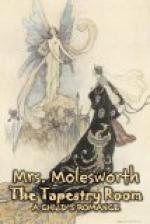They sat perfectly still to listen, but for a minute or two the sound which had caught Hugh’s attention was not repeated. Everything about them was silent, except that now and then a soft faint breeze seemed to flutter across the water, slightly rippling its surface as it passed. The strange, even light which had shone over all the scene ever since the children had stepped out at the hillside door had now grown paler: it was not now bright enough to distinguish more than can be seen by an autumn twilight. The air was fresh and clear, though not the least cold; the drooping forms of the low-hanging branches of the island trees gave the children a melancholy feeling when they glanced in that direction.
“I don’t like this very much,” said Jeanne. “It makes me sad, and I wanted to have fun.”
“It must be sad for the poor swan if it’s going to die,” said Hugh. “But I don’t mind this sort of sad feeling. I think it’s rather nice. Ah! Jeanne, listen, there it is again. They must be going to begin.”
“It” was a low sort of “call” which seemed to run round the shores of the lake like a preliminary note, and then completely died away. Instantly began from all sides the most curious music that Hugh and Jeanne had ever heard. It was croaking, but croaking in unison and regular time, and harsh as it was, there was a very strange charm about it—quite impossible to describe. It sounded pathetic at times, and at times monotonous, and yet inspiriting, like the beating of a drum; and the children listened to it with actual enjoyment. It went on for a good while, and then stopped as suddenly as it had begun; and then again, after some minutes of perfect silence, it recommenced in a low and regular chant—if such a word can be used for croaking—a steady, regular croak, croak, as if an immense number of harsh-sounding instruments were giving forth one note in such precise tune and measure that the harshness was softened and lost by the union of sound. It grew lower and lower, seeming almost to be about to die altogether away, when, from another direction—from the tree-shaded island in the centre of the lake—rose, low and faint at first, gathering strange strength as it mounted ever higher and higher, the song of the swan.
The children listened breathlessly and in perfect silence to the wonderful notes which fell on their ears—notes which no words of mine could describe, for in themselves they were words, telling of suffering and sorrow, of beautiful things and sad things, of strange fantastic dreams, of sunshine and flowers and summer days, of icy winds from the snow-clad hills, and days of dreariness and solitude. Each and all came in their turn; but, at the last, all melted, all grew rather, into one magnificent song of bliss and triumph, of joyful tenderness and brilliant hope, too pure and perfect to be imagined but in a dream. And as the last clear mellow notes fell on the children’s ears, a sound of wings seemed to come with them, and gazing ever more intently towards the island they saw rising upwards the pure white snow-like bird—upwards and upwards, ever higher, till at last, with the sound of its own joyous song, it faded and melted into the opal radiance of the calm sky above.




